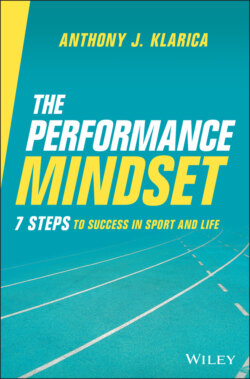Читать книгу The Performance Mindset - Anthony J. Klarica - Страница 23
How much practice?
ОглавлениеOver the past decade much has been written about the ‘10 000 hours rule’, which posits that 10 000 hours of practice is required to become expert in any field, such as sport, music, medical practice or teaching. The notion that 10 000 hours of practice will guarantee expertise was popularised by Malcolm Gladwell in his 2011 book Outliers.9 Although this ‘rule’ is often cited, it is an oversimplification that has been taken far too literally. Early discussion on 10 000 hours of practice was generated by Anders Ericsson and colleagues when reviewing contributing factors to musical expertise.10 They found that by the age of 20 ‘expert’ pianists had accumulated approximately 10 000 hours of practice, compared with a total of about 2000 hours for amateur pianists.
In Ericsson's 2016 book Peak: secrets from the new science of expertise (co‐authored by Robert Pool), he observes that ‘unfortunately, the 10 000 rule — which is the only thing that many people today know about the effects of practice — is wrong in several ways’.11 Among the reasons he identifies are that the amount of practice to become expert ‘varies from field to field’ and that ‘not every type of practice leads to improved ability’. He also says that ‘anyone can improve, but it requires the right approach’.
In sport, the reality is that 10 000 hours of dedicated, deliberate practice is unlikely to be accumulated by late teenage years or age 20. Research also confirms that in many sports athletes achieve national representation or professional contracts with less than 10 000 hours of dedicated practice. Even for those with high volumes of practice, it is not the differentiating factor. Mindset will contribute to practice and make best use of the time invested.
Transferring accumulated hours of training into competition environments is something I have seen many athletes struggle with. Large volumes of training can also lead to mental fatigue and burnout, creating additional pressure that negatively impacts both people and performance. One of the more common referrals to performance psychology practices is to help athletes replicate training levels in competition. Mindset is the bridge linking training and performance.
